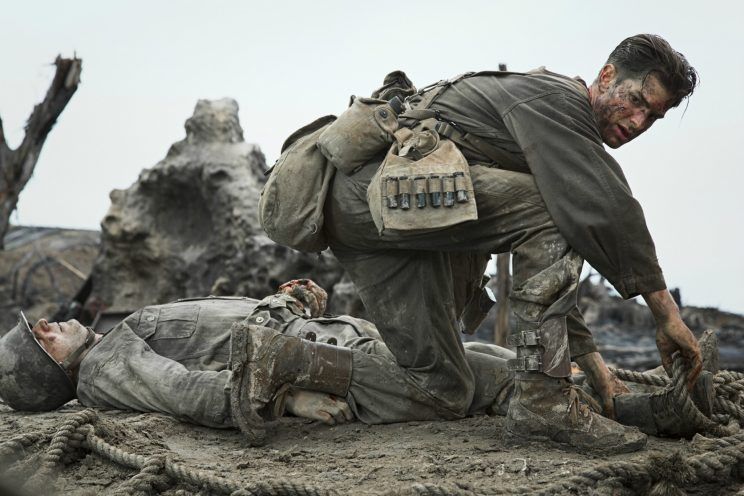Los Angeles (AP) – Is “Hacksaw Ridge” Mel Gibson’s redemption? Is it his atonement, or perhaps his miracle?
Don’t worry, we won’t be making any such weighty theological pronouncements — though these terms have all been bandied about in the run-up to Gibson’s first directorial effort in the 10 years since “Apocalypto.” That movie came out in 2006, only a few months after news broke of Gibson’s drunken anti-Semitic rant, which has plagued his career ever since.
But “Hacksaw Ridge,” the latest contribution to the canon of big World War II films, doesn’t need any redemptive backstory. Whatever you think of Gibson, and whatever your position on the relevance of his personal flaws to his art, his filmmaking prowess is evident. This big, bruising, viscerally violent yet also often moving film should be judged on its merits.
“Hacksaw Ridge,” starring the goofily appealing Andrew Garfield as the real-life character Desmond Doss, may not be a perfect movie, but it strikes an unusual balance. It’s a violent film whose hero — and moral core — espouses non-violence. It’s a war film that will also appeal to a faith-based audience. It’s a film that at moments can feel relentlessly corny — and a second later, painfully, horribly real.

Doss, a Seventh-day Adventist, was the first conscientious objector to be awarded the Congressional Medal of Honor. An Army medic, he refused to touch a weapon, believing he should be saving lives and not taking them. Though his exploits are a matter of record, we won’t spill all the details here.
After an early introduction to Doss as a boy in the Blue Ridge Mountains of Virginia, we pick up in young adulthood. When war breaks out with Japan, the young man feels compelled to enlist, despite the objections of his loving but abusive father (an excellent Hugo Weaving), a World War I veteran who was ruined by the experience. Doss is also going against the wishes of his new fiancée, Dorothy (fresh-faced Teresa Palmer), who begs him to stay. (The couple’s meet-cute scenes are charming but extremely retro and not a little corny.)
Doss arrives at training camp, eager to serve. But when he won’t touch a rifle, his superiors are aghast. “Private Doss does not believe in violence,” taunts one sergeant. “Do not look to him to save your life on the battlefield!” He’s played by Vince Vaughn, whose approach at first seems too comedic — as if in another movie. But he soon settles into an effectively understated performance.
Doss is pressured to leave the Army — subjected to beatings, harassment, ultimately a court-martial — and only survives due to dramatic intervention from on high. And then it’s on to Japan, to Okinawa and specifically the brutal battle at Hacksaw Ridge, high up on a punishing cliff where untold horrors await.
It is here that Gibson’s hand is the surest. The suddenness with which death arrives in combat, the unfathomable randomness of it all, a man’s jaunty bravado crumbling into paralyzing fear — the director sugar-coats nothing. As the men first climb toward their enemy, they pass their fallen comrades. Some corpses are in parts. Some have maggots crawling out of them.
It is during this battle that Doss becomes a hero, finding a way to save countless men by persevering when most others have been forced to retreat. He is guided by his faith; at one point, he asks God out loud what is expected of him. Garfield knows how to make such a scene feel honest — no easy feat.
Many fact-based movies end with some real-life footage. It’s always welcome, but here, it’s truly exciting to see Doss, alive and speaking (he died in 2006). His is a story you probably didn’t know, and will be glad you did. Gibson does well by it.
“Hacksaw Ridge,” a Lionsgate release, is rated R by the Motion Picture Association of America “for intense prolonged realistically graphic sequences of war violence including grisly bloody images.” Running time: 138 minutes. Three stars out of four.




